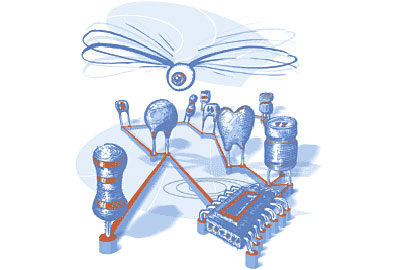Paessler IPCheck Server Monitor
Knowing what's happening on your network is always a challenge. Paessler wants to make your life easier with its IPCheck Server Monitor.

Despite issues with the multiple locations for management there is no doubt that there is a place for IPCheck in most datacentres. The main interface is simple and uncluttered and gives you the information you need in a screen that can be easily visually scanned.
Getting started
You have two options to get started. The first is to create a group of servers that you will manage - such as Exchange Servers, SQL Servers, Oracle, etc. This you can later use to enable the administrators of those servers to get access to the data and alerts gathered by IPCheck.
The second is to do an Automatic Network Discovery. You give IPCheck an IP address range and by default it will ping all the addresses in that range and look for HTTP, DNS, SMTP, POP3 and FTP services on each of the machines.
It took around 10 minutes to go through 250 IP addresses on the test network and once done it gave a report showing the machine DNS name, IP address and which sensors (services) it has found.
For operators who are under pressure to monitor large numbers of servers, you can put machines into groups and multiple groups can be monitored in different screens.
The software will also give you a clear view of what is happening on the machine you are currently using to run IPCheck, by going to the menu bar and selecting Administration and then Monitor Service Status.
Through the Administration menu you can also create report groups where users get a read-only access to the reports generated by IPCheck. They can share these reports with other users but only if they are listed as users in the same IPCheck installation.
Sign up today and you will receive a free copy of our Future Focus 2025 report - the leading guidance on AI, cybersecurity and other IT challenges as per 700+ senior executives
For real configuration you need to go to Control Panel and open IPCheck Server Monitor. This uses a tabbed interface to take you through detailed configuration. For example, you can route messages to SMS or ICQ instead instead of, or as well as, email. In theory, you can configure IPCheck to connect to a server that requires authentication but unfortunately, we couldn't get this to work no matter how hard we tried.
Reports can be kept up to 180 days and you can export to a range of different formats to enable you to use them for detailed analysis, which could prove very useful.
-
 Trump's AI executive order could leave US in a 'regulatory vacuum'
Trump's AI executive order could leave US in a 'regulatory vacuum'News Citing a "patchwork of 50 different regulatory regimes" and "ideological bias", President Trump wants rules to be set at a federal level
By Emma Woollacott Published
-
 Microsoft Excel is still alive and kicking at 40 – and it's surging in popularity as 82% of finance professionals report ‘emotional attachment’ to the spreadsheet software
Microsoft Excel is still alive and kicking at 40 – and it's surging in popularity as 82% of finance professionals report ‘emotional attachment’ to the spreadsheet softwareNews A recent survey found Gen Z and Millennial finance professionals have a strong “emotional attachment” to Microsoft Excel
By Emma Woollacott Published
-
 LastPass hit with ICO fine after 2022 data breach exposed 1.6 million users – here’s how the incident unfolded
LastPass hit with ICO fine after 2022 data breach exposed 1.6 million users – here’s how the incident unfoldedNews The impact of the LastPass breach was felt by customers as late as December 2024
By Emma Woollacott Published